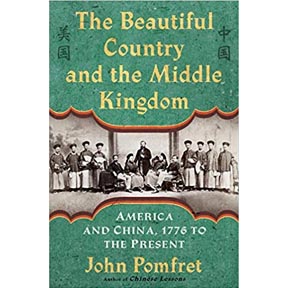John Pomfret’s The Beautiful Country and the Middle Kingdom: America and China, 1776 to the Present (2017) contains a lot of historical material about the Philippines, although it is mainly a history of America and China.
America in Chinese is 美國, which literally means beautiful country (美 mei in Mandarin, bi in Hokkien; 國 guo in Mandarin, kok in Hokkien). China, or 中國, is called the Middle Kingdom; 中 (zhong in Mandarin) means middle and 國, as we said earlier, means country. Since China was an imperial kingdom for 2,000 years, it is often referred to as a kingdom. In Chinese, it is also dubbed as 王國, the country of a king (王 wang in Mandarin, ong in Hokkien).
Looking at the index of Pomfret’s 693-page book published by Picador in New York, we see 16 pages that contain information about the Philippines.
To show how closely related the Philippines is to Sino-American relations, allow me to cite the following passage from the book with some comments:
And in December 1898, at the height of the Spanish-American War, President William McKinley, moved by what he said was “Providence,” had ordered the invasion of the Philippines and seized Guam. China suddenly did not look so far away.
American thinkers were proud of their nation’s growing power but anxious that without new markets, America’s factories would overproduce and precipitate an economic collapse. Alfred Mayer Mahan, a former US Navy officer who struck up a close friendship with young Teddy Roosevelt, argued in The Influence of Sea Power on History that only a mighty navy could provide the military muscle to support increased trade and national strength. Mahan urged Americans to turn their gaze toward the Far East as the primary locus of the coming world struggle. To him, Hawaii and the Philippines were the stepping-stones to China, a “carcass” destined to be devoured, he wrote, by Western “eagles.”
It is clear that after America invaded the Philippines, it saw its potential as a stepping-stone to devour the “carcass” of China. As the book reminds us, the invasion of the Philippines made China look not so far away to the Americans.
During the Boxer Rebellion in China in 1900, “it was not easy for McKinley to spare troops for China. An insurrection was raging in the Philippines,” according to Pomfret.
America in the end did send troops from its army in the Philippines to China to join seven other countries in suppressing the Boxer Rebellion.
But were it not for the outbreak of the Philippine-American war – or insurrection as the Americans preferred to call it – McKinley could have easily spared more American troops in the Philippines to invade China.
It can thus be said that the Philippines contributed indirectly to the Chinese people’s fight against imperialism and foreign aggression.
Lastly, a little known incident happened in 1981:
On the evening of June 18, 1981, an international team of 20 missionaries led by an American who called himself Brother David set to work in a coastal town in the Philippines, packing a tugboat and a barge with 232 plastic-wrapped one-ton packages containing one million Bibles.
Hours later, on a beach in Shantou, the southern Chinese port town where Adele Fielde had once schooled China’s first generation of Bible women, the two vessels were met by thousands of Chinese Christians, who unloaded their cargo and distributed the small black soft cover books around the country. A patrol of People’s Liberation Army soldiers appeared at the port early the next morning but found nothing but a few soggy Bibles. This operation, known as Project Pearl and led by a Pennsylvania-born ex-college football player turned evangelical named Dough Sutphen, remains the largest single Bible-smuggling mission in history.
It is no coincidence that 454 years ago, Spain occupied and decided to retain the Philippines as its colony in order to make it a stepping-stone to christianize China.
So, historically speaking, our country was invaded and occupied twice – first by an old colonist and later by a new imperialist – because of China.
Even the recent territorial dispute in the West Philippine Sea between our country and China in essence is more of a fight between the United States and China. The dispute can be more easily and peacefully settled without America’s interference. The US has always tried to instigate the Philippines to irritate and fight against China to serve its Indo-Pacific strategy, as well as to isolate and encircle China politically and militarily.
The Americans have been taking advantage of us without considering our national interest and situation, as the above show historical experiences.
Categories
PH in between US and China
